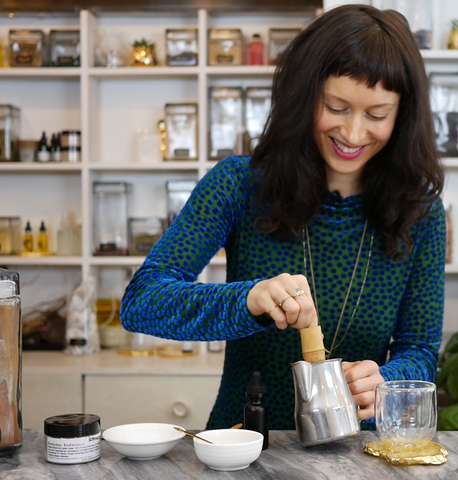Q&A with Herbalist Rachelle Robinett
Today on the blog we interview Rachelle Robinett, a wellness practitioner who uses a plant-based holistic approach to guide people on how to lead a balanced and healthy lifestyle.
Specializing in Complementary & Integrative Health and Clinical Herbalism, Rachelle is a wealth of knowledge on traditional medicine (including Ayurveda), Reiki I attunement, meditation, plant-based nutrition, mindfulness, and positive psychology.
Rachelle is the founder of Supernatural – a company dedicated to real world, plant-based wellness that includes an “herbal cafe,” workshops and events, and personal health coaching—as well as HRBLS, a line of herb infused gummies. She is also a resident herbalist at CAP Beauty in NYC.
We sat down for a Q&A with Rachelle to talk Ayurveda, trends in wellness, and tips for everyday healthy living.

Q&A
ELANVEDA: Do you incorporate Ayurveda into your lifestyle? If so, how?
RACHELLE: I have a great deal of respect for Ayurveda. My approach is really global, so I look at Ayurveda for assisting myself or for clients, but I also look at traditional Chinese medicine, I look at Western herbalism, I look at nutrition… I look at a lot of different systems to draw from them as needed. So, often I’m dipping into Ayurveda, but not exclusively. I definitely identify as Vata, but I don’t always avoid aggravating it. For example, I love raw food and will continue to eat raw food! Other than that, I have also oil pulled for a very long time, and I dry brush often; I absolutely love it.
E: Speaking of dry brushing, do you have some favorite herbal ingredients as far as skincare goes?
R: I love coconut, jojoba, honey, and fruit enzymes. If I’m doing any kind of facial exfoliation, I like to do an enzymatic refresh, and that tends to come from fruit peels. In terms of “beauty food” or “beauty herbs” I think that really comes from all the food that we eat and the lifestyle we live. But high-antioxidant herbs like rose hips or hibiscus can be really beautiful for getting the antioxidants you need for a nice glowy face—either topically or internally.
E: I know you’ve mentioned that Triphala is a staple for you. Any tips on how to incorporate Triphala into your regimen?
R: I personally like it for seasonal cleanses. My digestion moves really quickly, so I don’t use it on a regular basis. Periodically I’ll do a refresh of liquid meals and a course of triphala. I tend to recommend it to people for brief, focused periods of time, as opposed to sporadically. But I do have some clients who occasionally just need to move their digestive system more often than seasonally, if it naturally runs slower for them. The beauty of triphala is that it’s nourishing and not depleting.
E: Can you share a few go-to pharmaceutical swaps? i.e. natural alternative treatments for everyday ailments?
R: I want to start with a caveat that sometimes medication is really important, and I think there’s a place for pharmaceuticals, especially for severe mood imbalances or when we’re really sick. But if you’re looking for alternatives for the more daily aches and pains, herbs are where it’s at! For headaches you can look at white willow - that’s what Aspirin was originally made from. It can be used over time, especially for migraines. I really like cacao or 100% dark chocolate for headaches too. You get a little bit of a circulation boost and central nervous system stimulation—with only trace amounts of caffeine. Cacao is also full of magnesium and can be very relaxing.
There are so many herbs for sleep. I have an arsenal of these for my clients and can really tailor the selection based on which body system is keeping them up at night. Some of my favorites are Valerian, Chamomile and Lavender, California Poppy, Passionflower... It’s really individual as some people are having trouble sleeping because of a monkey mind, whereas others are feeling tension in their bodies, which something like rose petals can assist. I also love Skullcap, which is great for anxiety and incessant minds (I describe it as natural Xanax because it is binding to some of the same receptor sites in the brain as benzodiazepines). Kava is my favorite replacement for a glass of wine.
I definitely like garlic and ginger for colds and flus. I do use heat when treating people who are sick or trying to prevent sickness. Heat heat heat, spice spice spice, internal and out. Sweat it out.
E: Let’s talk adaptogens. “Adaptogen” is a big buzzword these days. What are your feelings on this kind of herb?
R: So, there’s a myth I’d like to bust—the notion that “adaptogen” is a synonym for “herb.” I’m starting to see that more and more, where people will say they’re taking adaptogens and then mention “chamomile” or “matcha,” but adaptogens is a very specific category of herbs, and there are lots of categories of herbs. And I don’t necessarily think adaptogens are the one that the modern world needs most; I think it’s the one that’s been really well marketed and caught on. The upside of that is that it’s opened a ton of hearts and minds to the power of plants. The downside is that there’s little understanding of what adaptogens are. The action of the adaptogen is nonspecific; it’s a broad, general effect in the body. In my experience, people are usually looking for a more specific action from herbs, be it antidepressant, or sleep aid, or something to help my anxiety or give me more energy or balance my hormones—and all of those actions come from plants that are more targeted in action. So, adaptogens are not bad, but it’s really worth understanding which herb is right for you. If it happens to be an adaptogen, great. If it’s not, great. Then it’s really important to know what dosage, what form, and when to take a break from it.
E: So, you live in New York City, and we’re based in Los Angeles. Something we often wonder is how to stay healthy living in a big, busy, polluted city when there’s so much toxicity in our environment?
R: It’s hard. I would say really focusing on the things we can control, like our water—using a good water filter—and making sure we’re sourcing our food from good places. If you have the means, then shopping at the farmer’s market is great. I think it’s a matter of inside-out. Making sure that our detoxification system—not just our liver, but remember that our skin, digestive system, kidneys, and lymph are all important in our body continuing to help us live in places like this with less damage than if it gets stagnant internally. For me, it’s eating really well and drinking really well. I’m a big fan of deep greens (vegetables and/or supplements like blue-green algae or chlorella). I think dry brushing is great, along with moving, lots and lots of sweating, staying hydrated, and just making sure we have enough roughage and hydration that our digestion is cleaning out every day if possible.
E: What’s a trend in the wellness industry you’d like to see grow?
R: Holistic plant-based wellness, meaning the inside-out, food first, regular use of plants for overall wellness, rather than spot-treating symptoms. Really building a relationship with the natural world again as our health support, whether it’s preventative or acute. Right now we’re very much in that stage of treating symptoms, putting out fires, and thinking about the “herb for this” and the “herb for that,” whereas we can think about every single bite and every single drink as an act of health. And it doesn’t mean that it all has to be “healthy.” If that glass of wine makes you happy and able to enjoy your life more fully, then please do—or birthday cake, or whatever it is. I don’t think that we need to pursue perfection, but we can think of health holistically (and even “basically”) as opposed to with a bandaging or damage-control approach.
E: What wellness trend would you like to see disappear?
R: It’s hard to say CBD or adaptogens because they’ve grown awareness of herbs and plant-based wellness so much. I think CBD is great, but it’s just one ingredient in the natural medicine cabinet along with all the other plants. It’s raising the awareness of the power of plants, and that’s excellent, but it absolutely, positively cannot compete with a diet or lifestyle that is out of balance. I see a lot of folks not adjusting diet or lifestyle and they’re distraught because they’ve started taking CBD and aren’t seeing life-changing benefits. I’m sympathetic because a lot of the information out there suggests it’s going to cure us all. That said, there’s minimal harm in it. You have to figure out the dosage, and if it’s even the right remedy for whatever you’re dealing with. But it is a good thing if you can get good quality, proper dosage, and it’s the right plant for you. With it being so popular, there’s a lot of poor quality stuff. In the last year in New York, CBD went from being seen as sketchy to every single coffee shop, every single bodega, every single sandwich board that you walk by hollering, “CBD lattes!” “Weed lattes!” “We have weed!” It’s just everywhere, and it’s way too overblown. Over-marketing happens. CBD is great but it’s not the best, just like adaptogens are great but they’re not the best.
I think the trend, really with the human species, is this incessant pursuit of the “magic pill”—that we’re going to find the one thing: the one diet, the one herb, the one tactic that will make us live longer, make us lose weight, make us more beautiful, whatever it is that we want—and there’s this optimism that we’re going to figure it out tomorrow, like, “Maybe it’s CBD!” But we actually have figured it out; it’s just a little more involved than one food or one herb. It’s a holistic, natural lifestyle and balance that can actually make our lives better.
Words and images courtesy of Rachelle Robinett (www.rachellerobinett.com)

Leave a comment
Please note, comments must be approved before they are published